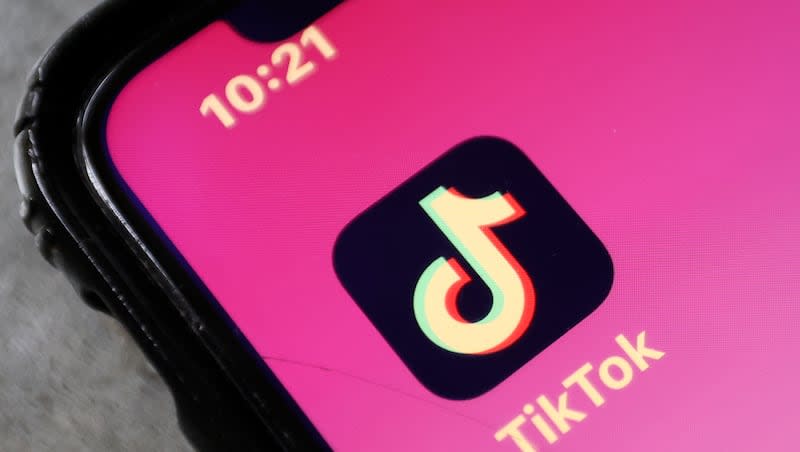Rep. Curtis on TikTok’s response to bill that would force its sale

The phones in Rep. John Curtis’ office were ringing off the hook a couple weeks ago. It was before the House voted on the bill requiring TikTok to divest from ByteDance, a Chinese company.
“We literally had calls that said, ‘So, what’s a congressman?’” Curtis said.
As part of TikTok’s media campaign against the bill, the company sent out a notification to some users asking them to input their ZIP code to call their representative. It’s a move Curtis described “as very effective for us and very ineffective for them.”
It led to an influx of calls not just in Curtis’ office. It’s been widely reported that the phones in congressional offices were ringing after the bill was introduced.
But it’s gotten bipartisan support, at least in the House.
A 50-0 vote out of a House committee only tends to happen on noncontroversial issues, Curtis explained in a phone interview with the Deseret News. The unanimous vote on the TikTok bill “would not have happened had they not pulled that stunt and showed members of Congress that exactly what we’re worried about is valid.”
TikTok opposes the bill. A spokesperson for the company previously told the Deseret News, “This legislation has a predetermined outcome: a total ban of TikTok in the United States.” The spokesperson added that it would “damage millions of businesses, deny artists an audience and destroy the livelihoods of countless creators across the country.”
After breezing through committee, the House swiftly passed the bill to the Senate, where it has come to a halt. Senate Majority Leader Chuck Schumer has not committed to floor action on the bill and also has not given any indication of a timeline.
Curtis didn’t only think TikTok sending out the notification was ineffective. He pointed out two issues with it.
“What really alarms me is that they could then use that same technique to influence an election or taint somebody’s opinion about an issue,” Curtis said, adding that when algorithms and artificial intelligence are at play, the issue is magnified.
But he also thought it was “disingenuous” that TikTok was “using kids as a pawn without taking time to educate them on the issue and do a deep dive on it.”
Curtis said people from younger generations often interact with the office and are personally educated on the issues they talk to him about. This was the first time Curtis said he’s gotten this kind of volume of calls from kids. The information they were given about the bill wasn’t accurate, he said.
When Curtis’ staff had the opportunity to explain the bill, he said he wasn’t aware of any instances where the conversation didn’t go well.
“We welcome all calls from these kids,” Curtis said, emphasizing that he thinks it’s good to hear from the younger generation. What’s concerning to him is how TikTok went about sending out those notifications.
TikTok told the Deseret News that the notifications were only sent out to users age 18 and older.
In addition to sending notifications to some users, the social media company has launched an advertising campaign.
“We think the public at-large should know that the government is attempting to trample the free speech rights of 170 million Americans and devastate 7 million small businesses nationwide,” a TikTok spokesperson told CNBC about the $2.1 million advertising campaign.
So, what does the general public think about the bill?
The CNBC All-America Economic Survey conducted March 15-19 asks this very question. Forty-seven percent of respondents said that TikTok should either be banned or banned unless it’s sold. Republicans were the group most strongly in favor of an outright ban or banning the app if it’s not sold, at 60%. Democrats followed at 40%. Independents were the most likely to say the app should not be banned, at 40%.
Among respondents, 20% said they favored an outright ban.
It’s not an apples to apples comparison because Pew Research Center didn’t (and couldn’t have) asked about the bill in March 2023, but around this time last year, the organization released its survey results on the question of banning TikTok. Fifty percent of respondents said they’d support banning the app. Republicans generally supported a ban at 60% and a plurality, but not majority, of Democrats also said they were in favor of a ban at 43%.
The Senate is reportedly mulling over changes to the bill — though it’s unclear what those changes would be. According to The Wall Street Journal, it’s possible that the amount of time allotted to ByteDance to sell TikTok could be lengthened. Either way, the bill’s progress in the Senate has been slow compared to how quickly the House moved on it.
Utah’s Sens. Mike Lee and Mitt Romney differ in their views of the bill. Billy Gribbin, director of communications for Lee, previously said the senator opposed the bill because the way the bill is written allocates too much power to the executive branch.
“Furthermore, it does not actually ban American companies from selling our data to either China or our own government — this is more about our home-grown surveillance state getting rid of competition than it is about protecting the privacy of Americans.”
Romney said he was in favor of the bill during an interview with KUTV. “The reality is we’re not going to see TikTok close down. It’s a very valuable property. It can be owned by American investors, it can be owned by the public, but it shouldn’t be owned by the Chinese government.”
